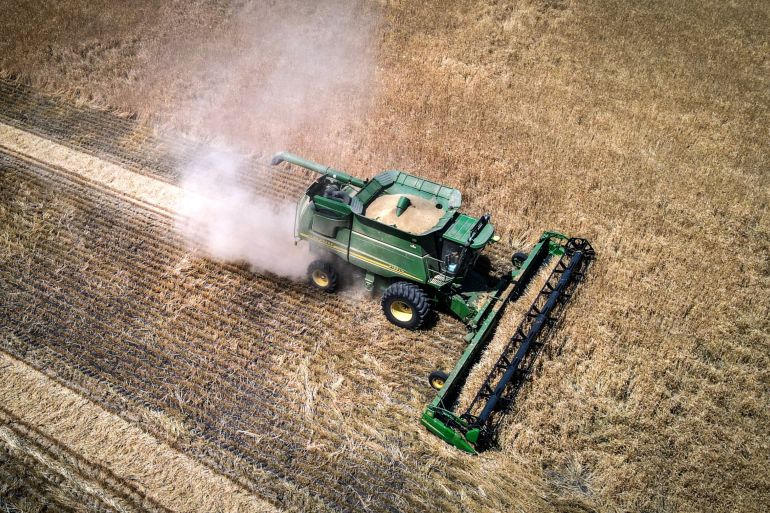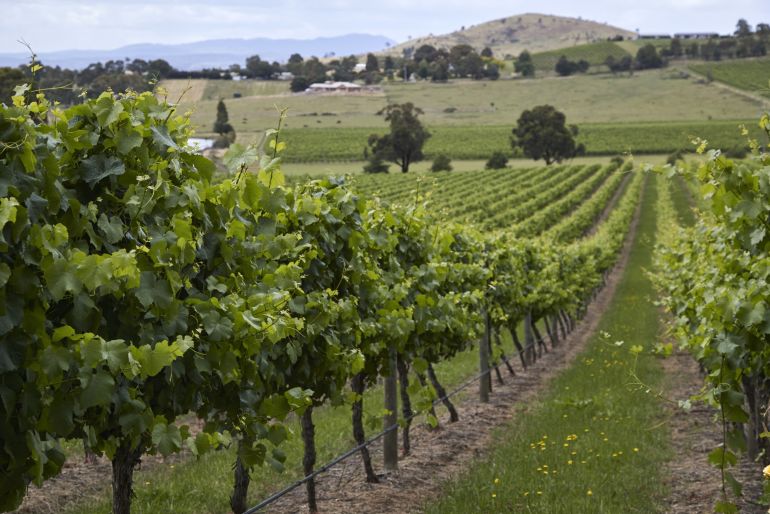Stung by China’s tariffs, Australian growers embrace new markets
Exporters of barley and wine are seeking to diversify after more than two years of Chinese trade restrictions.

Sydney, Australia – Brett Hosking, a grain farmer in Victoria, Australia, has taken a significant cut in profits since China slapped an 80.5 percent tariff on Australian malt barley in 2020.
Now, barley growers estimate that they are losing $50 Australian dollars ($35) per tonne, he said, because they are having to sell their quality malt barley to other markets as livestock feed.
Keep reading
list of 4 itemsFlights cancelled, rerouted over China’s drills near Taiwan
‘Highly provocative’: China military drills resume around Taiwan
APEC slashes growth forecasts on inflation, Ukraine risks
But it is not just barley growers who are under pressure. Other Australian industries, including timber, barley, sugar, lobster and wine, have suffered due to Chinese trade restrictions introduced since 2020.
Farmers in these industries are hopeful that China-Australia tensions will ease under Australia’s new Labor Party government, elected in May, after relations hit a new low when then Prime Minister Scott Morrison called for an international inquiry into the origins of COVID-19.
After a meeting with her Chinese counterpart Wang Yi last month, Australian foreign minister Penny Wong described their talks as the “first step towards stabilising the relationship”. Australian Prime Minister Anthony Albanese has said Australia will “cooperate with China where we can”, but “doesn’t respond to demands”.
But after more than two years of strained ties, some are ready to move on altogether, looking to diversify or get out while they still can.
Many barley growers are looking into alternative crops or increasing their production of other grains, Hosking said, although most have not switched crops entirely due to the need to consider the long-term sustainability of their farms as well as market changes.
“Maybe a little bit more canola, bit more lentils, even a little bit more … wheat in cases,” he told Al Jazeera.
China is Australia’s largest trade partner, accounting for nearly a third of the country’s international trade. Although Australia’s economy has held up well overall due to trade diversification and strong exports of commodities such as iron ore, the trade restrictions hit industries like barley hard.
“It’s probably one of the most significant market challenges we’ve faced,” said Hosking, who is also chair of GrainGrowers, the national voice for Australian grain farmers.
China is “still a really important market” for grain overall, he said, and farmers typically grow a range of grains, but “there isn’t another market in the world that demands malt barley at the same level that China does.”
A similar push to diversify is playing out in the wine sector, which has been hammered by Chinese anti-dumping duties as high as nearly 220 percent.
After the introduction of the duties, shares of the world’s largest listed winemaker, Australia’s Treasury Wine Estates Ltd, plummeted more than 13 percent, while hundreds of shipping containers of wine piled up at ports around China.

In New South Wales, Riverina Winegrape Growers, which represents 275 wine grape growers, is lobbying the state and federal governments to support growers who want to transition to new crops.
“It’s just having that financial reserve to transition into another type of perennial crop and even just the cost of removing vineyards are quite substantial,” CEO Jeremy Cass told Al Jazeera, suggesting that the government could employ grants or low-interest loans.
For grape growers, the dropoff in Chinese demand has been exacerbated by a perfect storm of complications including the pandemic and supply chain disruptions.
In terms of logistics, getting access to ships, containers and even trucks has been a struggle, Cass said.
“We’ve lost two or three trucking companies in our local region in the last 12 months to two years,” he said, describing how the population of truck drivers is ageing and not being replaced by younger generations drawn to white-collar work.
While the Riverina initially avoided the worst effects of the downturn, which saw some growers forced to leave their harvest on the vine, Cass does not expect the region to be so lucky this year.
“We do expect to see grapes left on the vine this year,” he said.
Another NSW grape grower, Frank, who asked to be referred to by his first name, said that the wineries he sells to have had to put a cap on what their growers produce.
“They only allow you to grow a certain amount of tonnes per acre,” he told Al Jazeera. “… So it’s going to be less returns and with the prices also being so low it basically means that we make a loss.”
But the wineries he works with have been good to their growers, he said. Other wineries have had to drop some vineyards altogether.
Many wine-grape growers have turned to a side hustle to stay afloat, according to Bruno Altin, a Riverina farmer, who believes growers need to start finding new markets for grapes aside from wine.
“There’s so many different cultures that don’t drink … So to be able to access those markets with a different product, that would be a game changer,” Altin said.

It is a sentiment that resonates across other affected industries like barley that are coming to grips with the drying up of the Chinese market.
While the “ultimate goal” would be to see Chinese tariffs against Australian barley removed, Hosking said, the current tensions present “a real opportunity” for the government to invest in market development.
“We’ve seen that a little bit already,” Hosking said. “We have had our first shipments of Australian malt barley go to … the Heineken group over in Mexico.”
“So in a way,” he added, “China did us a favour by causing us to lift our eyes a little bit further to new opportunities as an industry and I think there’s probably more opportunities like that.”
Cass said the challenges facing Australian farmers go beyond tensions with China and the government needs to recognise there are “problems all along the supply chain that need to be addressed”.
“We can grow as little fruit as we can, but at the end of the day, if we can’t get it to our customers in the form of wine out of the wineries, then it’s an issue,” he said.